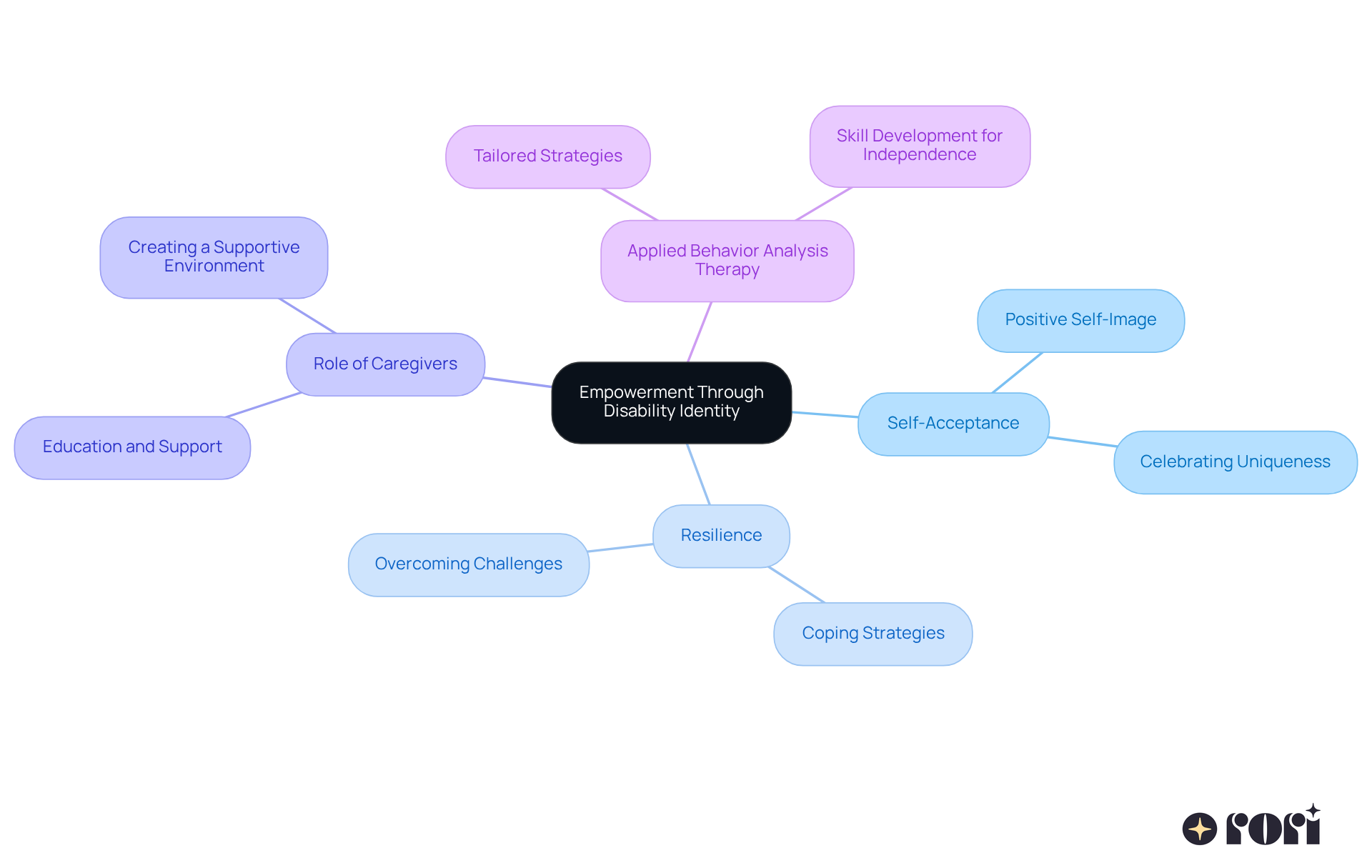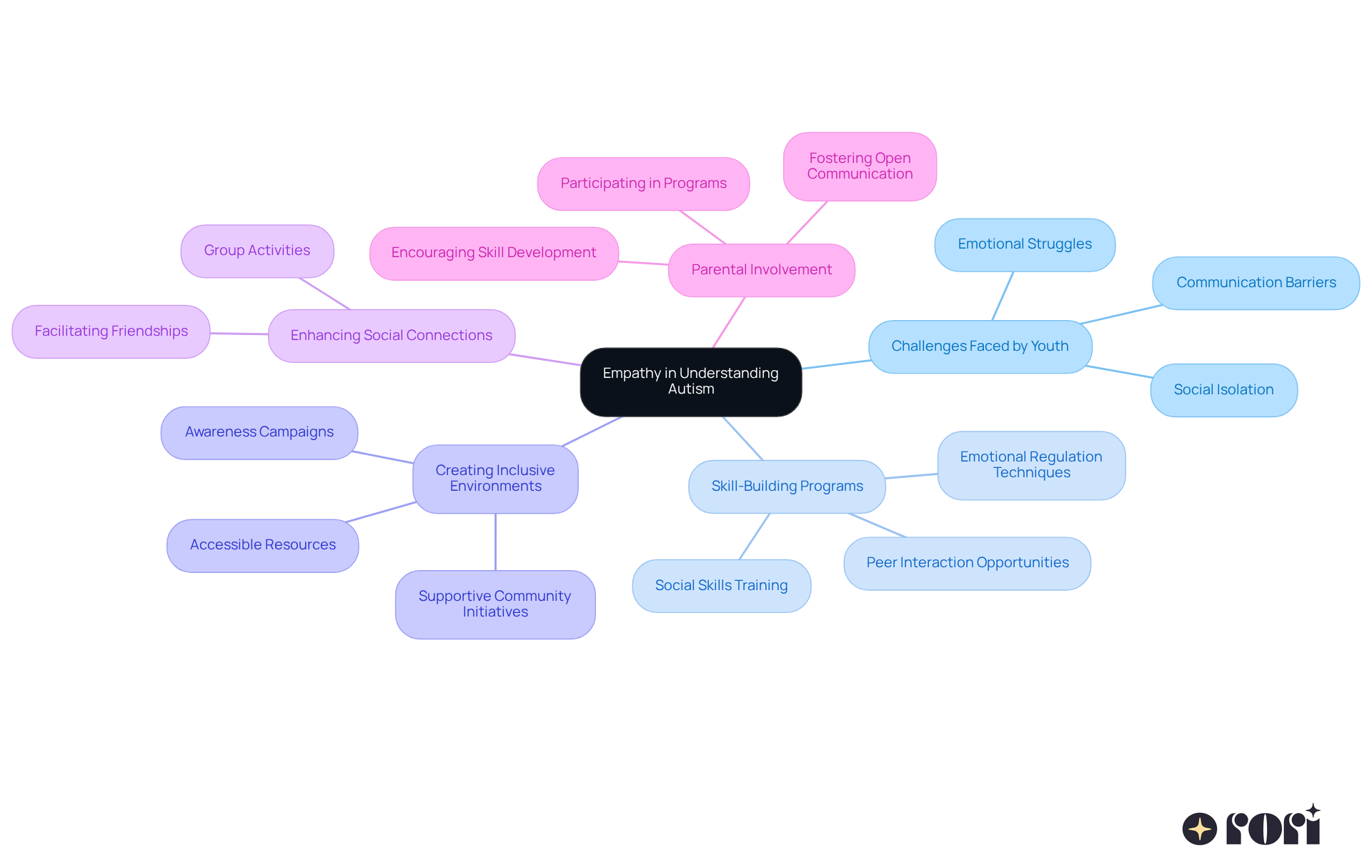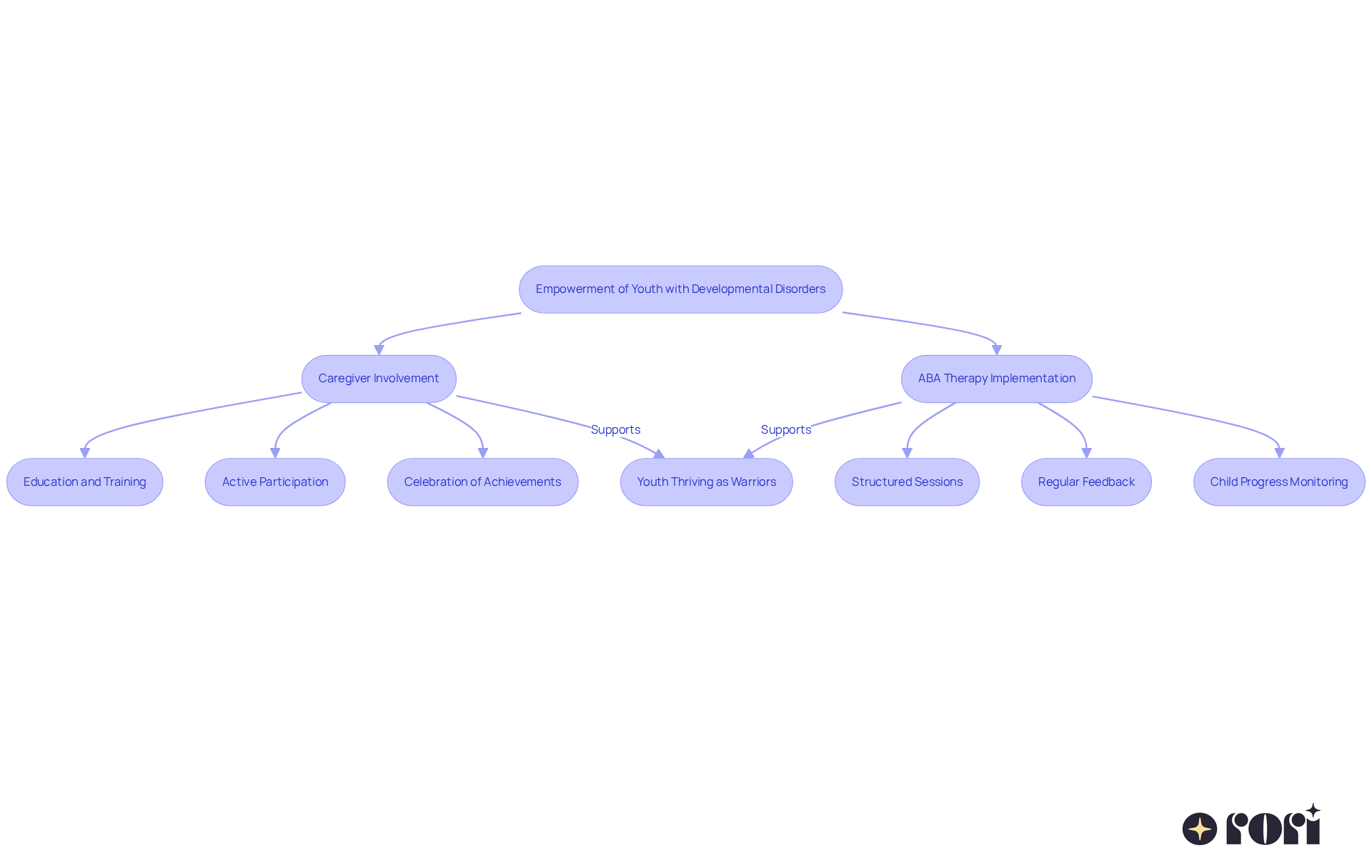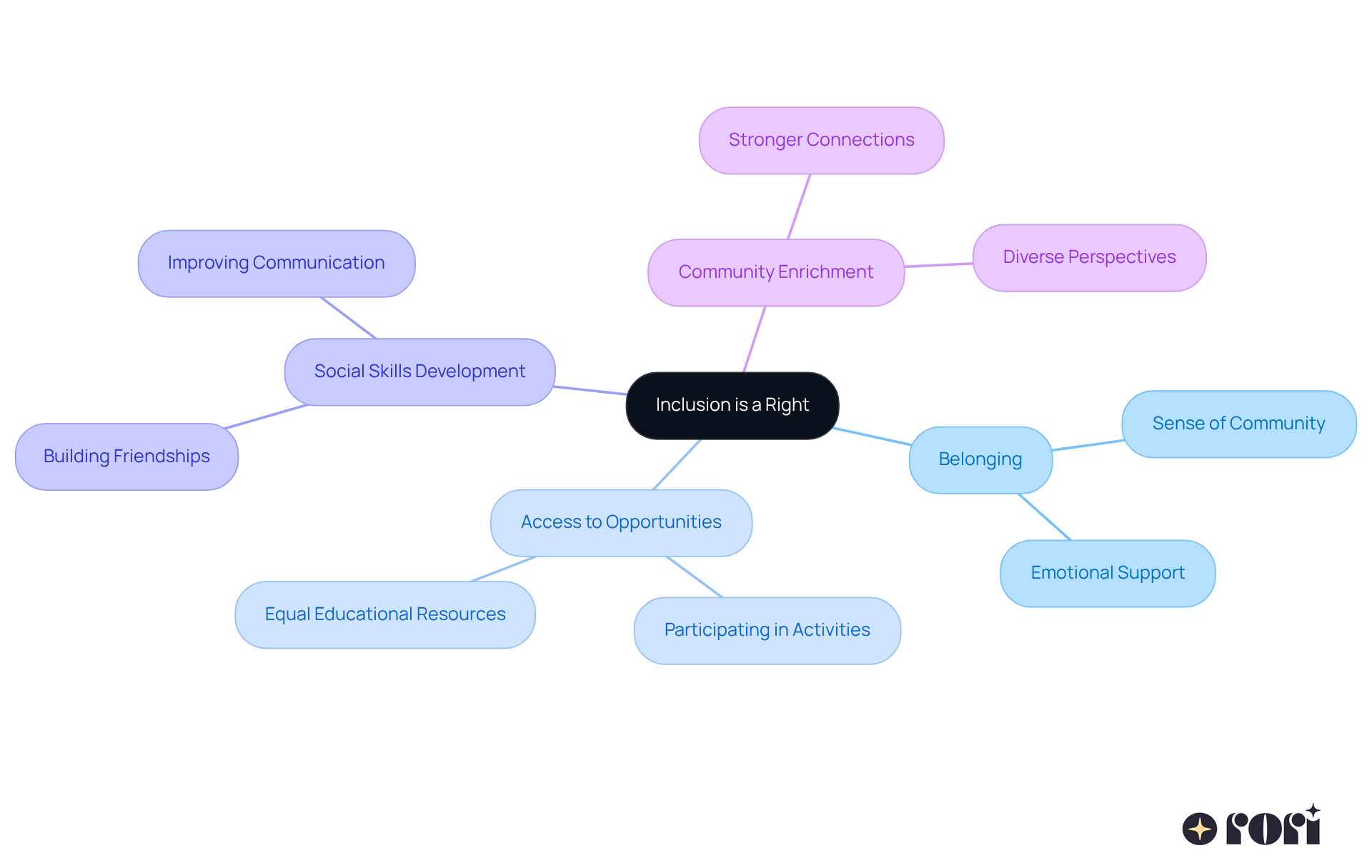The article "10 Powerful Quotes About Ableism to Inspire Change" highlights how quotes can spark meaningful conversations about ableism and foster inclusivity. It emphasizes that understanding disabilities is a vital part of our identities. By advocating for rights and nurturing empathy, we can create supportive environments for individuals with developmental differences. This message is beautifully supported by the therapeutic approaches at Rori Care.
Let’s explore this together! The quotes shared in the article serve as powerful reminders of the importance of inclusivity, urging us to reflect on our own experiences and how we can contribute to positive change. By sharing these insights, we can deepen our understanding and build a community that embraces everyone.
Powerful quotes about ableism remind us of the challenges faced by individuals with disabilities, but they also spark change and understanding. These poignant statements encourage us to view disabilities through a lens of empowerment and identity, rather than limitation. Yet, even with growing awareness, many still struggle with the societal constructs that uphold ableism.
So, how can these inspiring words transform perceptions and foster a more inclusive world for all? Let’s explore this together! 🤝
This powerful statement encourages individuals to view their disabilities as integral to their identity. It promotes self-acceptance and resilience—qualities that are so crucial for young individuals with autism. At Rori Care, we’re all about empowering young individuals through Applied Behavior Analysis therapy, which is tailored to each person's unique needs and helps build essential skills for independence.
By nurturing a setting where disabilities are celebrated, guardians can really assist young individuals in developing a positive self-image. This, in turn, leads to enhanced social interactions and greater independence. Our dedication to caregiver education ensures that families receive the strategies and support they need to foster their child’s development and success. Let’s explore this journey together!

This quote is a gentle reminder that no one should be defined solely by their disabilities. For young individuals with autism, ADHD, and learning disabilities, engaging in activities that highlight their strengths can truly foster a sense of achievement and belonging. At Rori Care, we wholeheartedly believe in the magic of personalized therapy, like Applied Behavior Analysis (ABA), which is tailored to meet each person's unique needs.
Encouraging participation in hobbies or skills not only helps these young individuals build confidence and forge social connections, but it also boosts their communication skills and self-esteem—key ingredients for their growth. Our commitment to neurodiversity and the success of every individual inspires us to support families in overcoming challenges and nurturing development through our social skills group therapy.
Let’s explore this journey together! We’re here to help you every step of the way!

Recognizing ableism as a social construct is key to fostering inclusivity, a point often emphasized in quotes about ableism. At Rori Care, we believe that when we share quotes about ableism to inform households and communities about its harmful effects, we can work together to break down these barriers.
Our patient-focused approach ensures that we empower families and individuals in developmental care through tailored ABA therapy. This creates supportive environments where children can thrive and learn essential skills for independence.
Through our compassionate Applied Behavior Analysis treatment, we guide individuals on their autism care journey, ultimately enhancing the quality of life for those on the autism spectrum. Let’s explore this together! We’re here to help you every step of the way!
Awareness is a powerful catalyst for change! By educating ourselves about ableism, we can challenge misconceptions and foster empathy, as highlighted in various quotes about ableism. This knowledge empowers families to advocate for their children, ensuring they receive the support and understanding they deserve in schools and social settings.
At Rori Care, we’re here to guide families through compassionate Applied Behavior Analysis treatment. Our focus is on building independence through essential skills like communication, social skills, and daily living activities. Our dedicated clinical leadership team values neurodiversity and is committed to helping youth achieve success. We provide parents with the principles and strategies they need to support their children's behavioral goals.
Let’s explore this journey together! Your family deserves the best support, and we’re here to help every step of the way!

This quote humorously reminds us that the concept of 'normal' is subjective. For youngsters with autism, embracing their unique characteristics can lead to a more fulfilling life. At Rori Care, we believe that behavioral intervention services can significantly benefit individuals of all ages, including those with Autism Spectrum Disorders and ADHD.
By equipping caregivers with the principles of Applied Behavior Analysis (ABA), we help create a supportive atmosphere where individuals can celebrate their differences and promote development. Encouraging families to appreciate their offspring's unique qualities not only enhances communication and relationships but also ensures that young individuals feel valued for who they are, not how they compare to others. Let’s explore this together!
Empathy plays a crucial role in understanding the experiences of youth with autism. This quote serves as a gentle reminder for both peers and adults to pause and reflect on the challenges these young individuals face. By nurturing empathy and empowering them with essential skills through Rori Care's skill-building programs, we can create inclusive environments where they truly feel understood and accepted.
This approach not only enhances social connections and friendships but also aligns beautifully with Rori Care's commitment to supporting families impacted by developmental disorders. Parents have a wonderful opportunity to encourage this empowerment by actively participating in their children's skill development and fostering open lines of communication. Let’s explore this together!

Advocacy is so important when it comes to creating meaningful change! By standing up against ableism and advocating for the rights of youths with autism, families can utilize quotes about ableism to help break down barriers and promote inclusivity. This proactive approach allows parents to take charge of their child's journey, ensuring they get the support and resources they need.
At Rori Care, we’re dedicated to providing comprehensive and compassionate Applied Behavior Analysis (ABA) therapy that fosters independence in young individuals. Our clinical leadership team truly values neurodiversity and is passionate about helping children thrive by equipping them with essential skills to navigate the world.
We also understand that navigating insurance can be overwhelming, so we’re here to help with options that may cover up to 100% of ABA therapy costs! Our commitment to educating providers enhances support and informed decision-making, ultimately leading to better behavioral outcomes and empowering families in their advocacy efforts. Let’s explore this journey together!
This empowering statement encourages young individuals to see themselves as strong individuals. By nurturing a warrior mindset, we can help youth with developmental disorders build resilience and confidence. Celebrating their achievements, no matter how small, reinforces their identity as capable people who can overcome challenges.
With the support of Applied Behavior Analysis (ABA) therapy—the only scientifically validated treatment for autism covered by insurance—caregivers can enhance their understanding of effective strategies that promote learning and social skills. Remarkably, when suggested hours are fully implemented with active parental involvement, 90% of young individuals show significant progress.
This patient-focused approach not only improves communication and relationship management but also empowers caregivers through education, preparing them to make informed decisions that positively impact their children's development. By actively participating in their children’s journey, caregivers can create an environment where young ones thrive, reinforcing their identity as warriors in the face of challenges. Let’s explore this together!

Inclusion is so important for helping young individuals with developmental differences feel like they truly belong. It’s a gentle reminder that everyone deserves the chance to participate fully in our society. By embracing inclusive practices in our schools and communities, we can make sure that kids with developmental differences have access to the same opportunities as their peers. This not only helps them develop social skills but also fosters their independence.
Let’s explore this together! When we support each other in creating inclusive environments, we’re not just opening doors for these kids; we’re enriching our entire community. It’s about making connections and understanding that every child has something valuable to contribute. So, let’s keep the conversation going and take action to ensure everyone feels included!

This quote about ableism beautifully captures the essence of neurodiversity, encouraging us to embrace our differences rather than see them as flaws. By creating a nurturing environment of acceptance, we can help our youth with autism feel valued and understood. This, in turn, paves the way for positive self-esteem and better social interactions.
With Applied Behavior Analysis (ABA) therapy tailored to each individual’s unique needs, parents can play an active role in their child's development. Did you know that an impressive 90% of young individuals show substantial improvement when the recommended hours of ABA therapy are fully implemented with engaged parental involvement? That’s pretty remarkable! Plus, ABA therapy is the only scientifically proven treatment for autism that insurance covers.
This involvement doesn’t just enhance behavioral outcomes; it also empowers caregivers with strategies that promote their child’s learning and social skills. It reinforces the beautiful idea found in many quotes about ableism that 'we are not broken; we are just different.' Let’s explore this together!
If you’re looking for support, remember that you’re not alone on this journey. We’re here to help you every step of the way!
The essence of our conversation about ableism lies in the belief that disabilities should never define a person’s worth or abilities. It’s so important to view disability as a vital part of identity, not just a limitation. This article shares some empowering quotes that serve as a rallying call for inclusivity and self-acceptance, inviting us all to break down the barriers that ableism creates.
As we journey through this topic, several key themes emerge:
These play significant roles in fostering change. Quotes that remind us of the subjective nature of "normal" encourage us to celebrate our unique traits and contributions. Additionally, the discussion highlights the essential role of education and support systems, like Applied Behavior Analysis therapy, in empowering individuals with disabilities and their families to navigate challenges and thrive.
Reflecting on this, the journey to dismantle ableism is not just about individual empowerment; it’s also about collective action. By embracing diversity and advocating for inclusion, we can create spaces where everyone feels valued and accepted. It’s crucial to keep this conversation going and take proactive steps to ensure that every individual, regardless of ability, can fully participate in all aspects of life. Let’s embrace these quotes as sources of inspiration and motivation to foster a more inclusive world for all! Together, we can make a difference!
What is the main philosophy of Rori Care regarding disabilities?
Rori Care believes that disabilities are a part of an individual's identity and not a limitation. They promote self-acceptance and resilience, especially for young individuals with autism.
How does Rori Care support young individuals with autism?
Rori Care empowers young individuals through Applied Behavior Analysis (ABA) therapy tailored to each person's unique needs, helping them build essential skills for independence.
What role do guardians play in the development of young individuals at Rori Care?
Guardians can assist young individuals in developing a positive self-image by nurturing an environment where disabilities are celebrated, leading to enhanced social interactions and greater independence.
What is the significance of the quote "My disability does not define me; my actions do" in the context of Rori Care?
This quote emphasizes that individuals should not be defined solely by their disabilities. Rori Care encourages young individuals to engage in activities that highlight their strengths, fostering a sense of achievement and belonging.
How does Rori Care enhance the confidence and social skills of young individuals?
By encouraging participation in hobbies and personalized therapy like ABA, Rori Care helps young individuals build confidence, forge social connections, and improve their communication skills and self-esteem.
What is the approach of Rori Care towards ableism?
Rori Care recognizes ableism as a social construct that needs to be dismantled. They aim to foster inclusivity by informing households and communities about the harmful effects of ableism.
How does Rori Care ensure a supportive environment for developmental care?
Rori Care uses a patient-focused approach with tailored ABA therapy to create supportive environments where children can thrive and learn essential skills for independence.